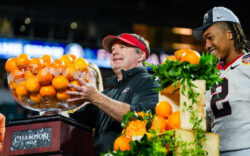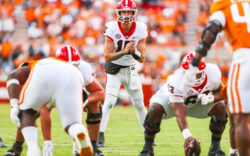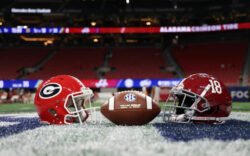When the NCAA announced in late June that it had changed its rules to allow college athletes to make money off their name, image and likeness (NIL), I first thought of Todd Gurley. Then I thought of Keith Marshall.
Following the opening of this new market on July 1, college athletes began striking endorsement deals with companies big and small. Clemson quarterback D.J. Uiagalelei has deals with Bojangles and Dr. Pepper. Nick Saban said at SEC Media Days that Alabama quarterback Bryce Young was approaching seven figures earnings in endorsement deals, although that seems hyperbolic. It’s even beginning to affect high school recruits. Five-star quarterback Quinn Ewers decided to skip his senior year of high school to go to Ohio State and earn some of that sweet NIL cash. He’s now hocking kombucha.
Of course, this has also affected UGA. J.T. Daniels has a deal for autographs and memorabilia, and is a “brand ambassador” for Zaxby’s. He’s also partnered with Extra Special People, a nonprofit for people with developmental disabilities that’s long been supported by UGA football. But it’s not only quarterbacks getting deals. Running back James Cook and cornerback Kelee Ringo are both partnered with Bojangles. A slew of offensive linemen made an appearance at Campton Restaurant in Monroe, lest you think it’s only corporations getting into this new era of college football.
It’s a sea change. From a player’s rights perspective, it’s the most important moment in college sports history. But it’s still a half measure. There’s plenty of work to do before college athletes get the compensation they deserve: status as employees and a full salary.
Gurley and Marshall came to Athens in 2012 and quickly became stars as the vaunted “Gurshall” tandem. Although it was Marshall who came in as the higher-rated of the duo, it was Gurley who was the breakout star and spent the better part of three seasons as the best running back in college football.
You all know where I’m going with this. A few years later, in October 2014, Gurley—a Heisman front-runner with 773 yards and eight rushing touchdowns to his name through five games—was suspended for four games for selling autographs and signed memorabilia. It’s simplistic to say that’s what ended Georgia’s shot at an SEC or national title that season, but it did rob the team of all momentum heading into the toughest part of the schedule. So when the NCAA removed restrictions on NIL, I, selfishly, couldn’t help but think of what could have been that season.
In the end, though, Gurley got his. He was drafted in the first round of the 2015 NFL Draft and has made almost $50 million in career earnings. But Marshall didn’t. His college career was beset with injuries, and he was drafted in the seventh round of the 2016 NFL Draft by Washington but waived the next season.
For Marshall and many players like him, there is a small window of opportunity to maximize their earnings as a football player. He was a highly rated recruit and would’ve signed deals before he stepped on campus. And God knows he and Gurley could’ve made a killing on “Gurshall” T-shirts in 2013.
For every Gurley, there are a dozen Marshalls. For every Marshall, there are a dozen guys you’ll never hear of. Guys who work for the program every single day. Guys whose main focus in life is college football but aren’t big enough stars to get any significant NIL deal. All they get is a scholarship to pursue a field of study that was likely dictated by what majors are easiest with a football player’s schedule.
The NCAA may be evil, but it ain’t dumb. It saw which way the wind was blowing as state after state passed NIL legislation. So it decided to get out ahead of it by finally allowing players to make some scratch. It’s a half-measure, a desperate act of survival that goes against all the organization’s principles. But it’s the lesser evil versus the SEC saying “to hell with you” and starting its own league.
It’s objectively good that player’s are finally allowed to make money. But NIL is only passing the buck to preserve the illusion of amateurism. Corporations can pay them, but schools won’t, so they’re still amateurs. Which leaves that fat pile of cash from TV deals—where the real money is—that players still won’t see a dime of.
Like what you just read? Support Flagpole by making a donation today. Every dollar you give helps fund our ongoing mission to provide Athens with quality, independent journalism.









